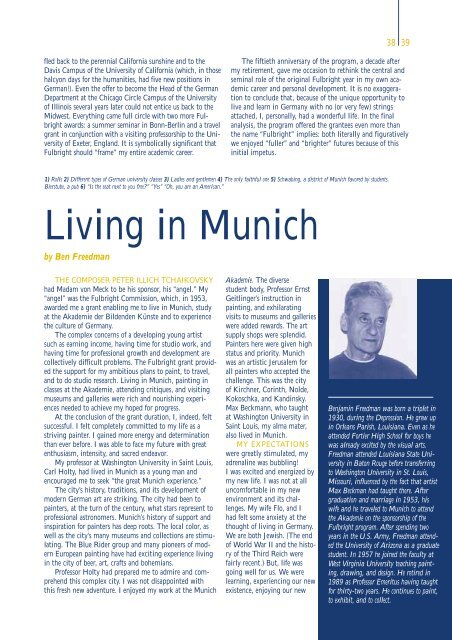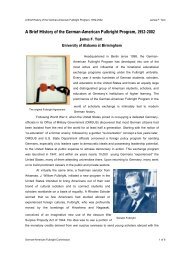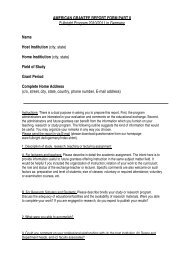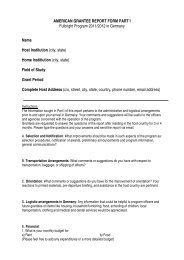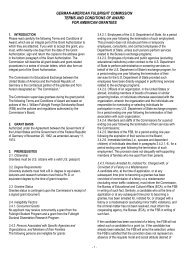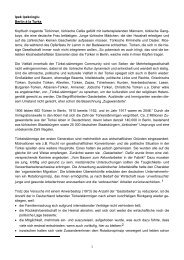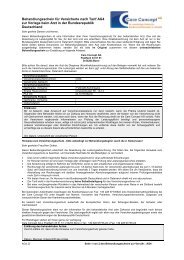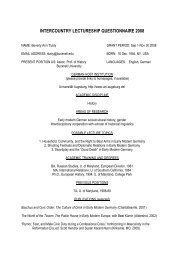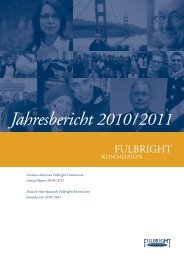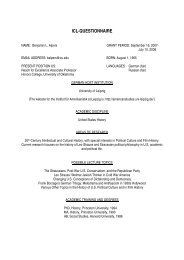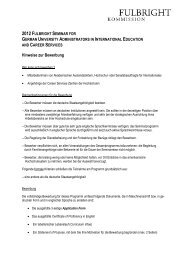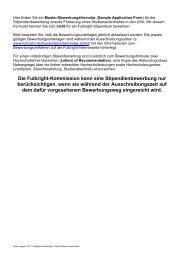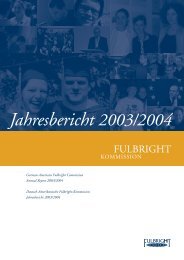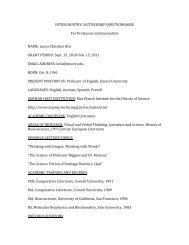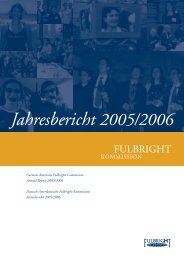The First Class of Fulbrighters - Fulbright-Kommission
The First Class of Fulbrighters - Fulbright-Kommission
The First Class of Fulbrighters - Fulbright-Kommission
You also want an ePaper? Increase the reach of your titles
YUMPU automatically turns print PDFs into web optimized ePapers that Google loves.
fled back to the perennial California sunshine and to the<br />
Davis Campus <strong>of</strong> the University <strong>of</strong> California (which, in those<br />
halcyon days for the humanities, had five new positions in<br />
German!). Even the <strong>of</strong>fer to become the Head <strong>of</strong> the German<br />
Department at the Chicago Circle Campus <strong>of</strong> the University<br />
<strong>of</strong> Illinois several years later could not entice us back to the<br />
Midwest. Everything came full circle with two more <strong>Fulbright</strong><br />
awards: a summer seminar in Bonn-Berlin and a travel<br />
grant in conjunction with a visiting pr<strong>of</strong>essorship to the University<br />
<strong>of</strong> Exeter, England. It is symbolically significant that<br />
<strong>Fulbright</strong> should “frame” my entire academic career.<br />
38 39<br />
<strong>The</strong> fiftieth anniversary <strong>of</strong> the program, a decade after<br />
my retirement, gave me occasion to rethink the central and<br />
seminal role <strong>of</strong> the original <strong>Fulbright</strong> year in my own academic<br />
career and personal development. It is no exaggeration<br />
to conclude that, because <strong>of</strong> the unique opportunity to<br />
live and learn in Germany with no (or very few) strings<br />
attached, I, personally, had a wonderful life. In the final<br />
analysis, the program <strong>of</strong>fered the grantees even more than<br />
the name “<strong>Fulbright</strong>” implies: both literally and figuratively<br />
we enjoyed “fuller” and “brighter” futures because <strong>of</strong> this<br />
initial impetus.<br />
1) Rolls 2) Different types <strong>of</strong> German university classes 3) Ladies and gentlemen 4) <strong>The</strong> only faithful one 5) Schwabing, a district <strong>of</strong> Munich favored by students.<br />
Bierstube, a pub 6) “Is the seat next to you free?” “Yes” “Oh, you are an American.”<br />
Living in Munich<br />
by Ben Freedman<br />
THE COMPOSER PETER ILLICH TCHAIKOVSKY<br />
had Madam von Meck to be his sponsor, his “angel.” My<br />
“angel” was the <strong>Fulbright</strong> Commission, which, in 1953,<br />
awarded me a grant enabling me to live in Munich, study<br />
at the Akademie der Bildenden Künste and to experience<br />
the culture <strong>of</strong> Germany.<br />
<strong>The</strong> complex concerns <strong>of</strong> a developing young artist<br />
such as earning income, having time for studio work, and<br />
having time for pr<strong>of</strong>essional growth and development are<br />
collectively difficult problems. <strong>The</strong> <strong>Fulbright</strong> grant provided<br />
the support for my ambitious plans to paint, to travel,<br />
and to do studio research. Living in Munich, painting in<br />
classes at the Akademie, attending critiques, and visiting<br />
museums and galleries were rich and nourishing experiences<br />
needed to achieve my hoped for progress.<br />
At the conclusion <strong>of</strong> the grant duration, I, indeed, felt<br />
successful. I felt completely committed to my life as a<br />
striving painter. I gained more energy and determination<br />
than ever before. I was able to face my future with great<br />
enthusiasm, intensity, and sacred endeavor.<br />
My pr<strong>of</strong>essor at Washington University in Saint Louis,<br />
Carl Holty, had lived in Munich as a young man and<br />
encouraged me to seek “the great Munich experience.”<br />
<strong>The</strong> city’s history, traditions, and its development <strong>of</strong><br />
modern German art are striking. <strong>The</strong> city had been to<br />
painters, at the turn <strong>of</strong> the century, what stars represent to<br />
pr<strong>of</strong>essional astronomers. Munich’s history <strong>of</strong> support and<br />
inspiration for painters has deep roots. <strong>The</strong> local color, as<br />
well as the city’s many museums and collections are stimulating.<br />
<strong>The</strong> Blue Rider group and many pioneers <strong>of</strong> modern<br />
European painting have had exciting experience living<br />
in the city <strong>of</strong> beer, art, crafts and bohemians.<br />
Pr<strong>of</strong>essor Holty had prepared me to admire and comprehend<br />
this complex city. I was not disappointed with<br />
this fresh new adventure. I enjoyed my work at the Munich<br />
Akademie. <strong>The</strong> diverse<br />
student body, Pr<strong>of</strong>essor Ernst<br />
Geitlinger’s instruction in<br />
painting, and exhilarating<br />
visits to museums and galleries<br />
were added rewards. <strong>The</strong> art<br />
supply shops were splendid.<br />
Painters here were given high<br />
status and priority. Munich<br />
was an artistic Jerusalem for<br />
all painters who accepted the<br />
challenge. This was the city<br />
<strong>of</strong> Kirchner, Corinth, Nolde,<br />
Kokoschka, and Kandinsky.<br />
Max Beckmann, who taught<br />
at Washington University in<br />
Saint Louis, my alma mater,<br />
also lived in Munich.<br />
MY EXPECTATIONS<br />
were greatly stimulated, my<br />
adrenaline was bubbling!<br />
I was excited and energized by<br />
my new life. I was not at all<br />
uncomfortable in my new<br />
environment and its challenges.<br />
My wife Flo, and I<br />
had felt some anxiety at the<br />
thought <strong>of</strong> living in Germany.<br />
We are both Jewish. (<strong>The</strong> end<br />
<strong>of</strong> World War II and the history<br />
<strong>of</strong> the Third Reich were<br />
fairly recent.) But, life was<br />
going well for us. We were<br />
learning, experiencing our new<br />
existence, enjoying our new<br />
Benjamin Freedman was born a triplet in<br />
1930, during the Depression. He grew up<br />
in Orleans Parish, Louisiana. Even as he<br />
attended Fortier High School for boys he<br />
was already excited by the visual arts.<br />
Freedman attended Louisiana State University<br />
in Baton Rouge before transferring<br />
to Washington University in St. Louis,<br />
Missouri, influenced by the fact that artist<br />
Max Beckman had taught there. After<br />
graduation and marriage in 1953, his<br />
wife and he traveled to Munich to attend<br />
the Akademie on the sponsorship <strong>of</strong> the<br />
<strong>Fulbright</strong> program. After spending two<br />
years in the U.S. Army, Freedman attended<br />
the University <strong>of</strong> Arizona as a graduate<br />
student. In 1957 he joined the faculty at<br />
West Virginia University teaching painting,<br />
drawing, and design. He retired in<br />
1989 as Pr<strong>of</strong>essor Emeritus having taught<br />
for thirty-two years. He continues to paint,<br />
to exhibit, and to collect.


